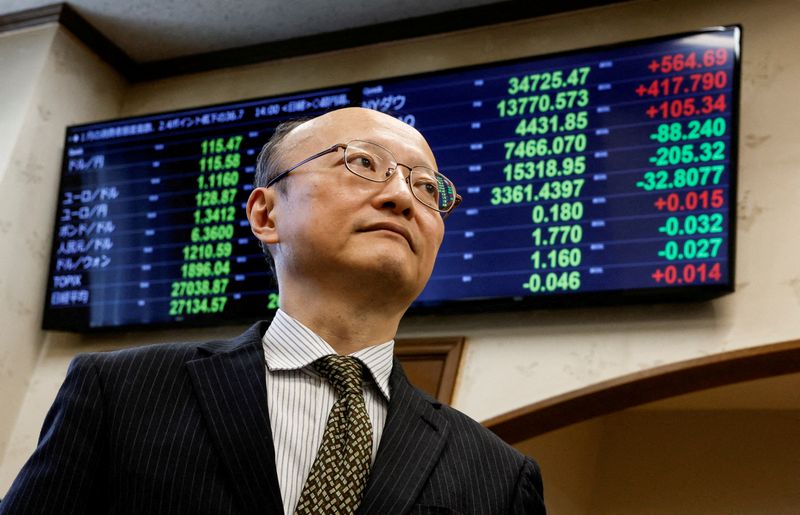By Leika Kihara
STRESA, Italy (Reuters) -Japan stands ready to take appropriate action in the market "any time" to counter excessive moves in the yen, its top currency diplomat Masato Kanda said on Friday, issuing a fresh warning on the chance of renewed exchange-rate intervention.
Kanda also said he was in frequent and close contact with overseas counterparts, particularly in the U.S., on issues including financial markets.
"Under a flexible exchange-rate regime, we won't need to intervene if currency moves are stable. But if there are excessively volatile moves that have an adverse effect on the economy, we need to take action, and doing so would be justified," Kanda told reporters.
"We are ready to act any time as needed against currency moves," he said after accompanying Japanese Finance Minister Shunichi Suzuki for the first-day session of the G7 finance leaders' meeting in the northern Italian city of Stresa.
Kanda made his remarks a day after U.S. Treasury Secretary Janet Yellen said currency interventions should be used only rarely and in a well-communicated way.
At the Group of Seven meeting, Japan told its counterparts that vigilance was needed against excessive volatility in the currency market that was driven by speculative moves, Kanda said.
Japan also told the meeting it was important to "respond appropriately" to excessive, disorderly moves in the currency market that would hurt the economy, he added.
Japan will push for the G7 finance leaders' communique to include language reaffirming the group's stance that excessive and volatile currency moves were undesirable, he said.
Kanda, who oversees Japan's currency policy as vice finance minister for international affairs, declined to comment when asked about the yen's recent declines.
The yen has lost 11% against the dollar this year on expectations the U.S. Federal Reserve will be in no rush to cut interest rates, which would keep the divergence between U.S. rates and Japan's ultra-low rates large.
SUSPECTED INTERVENTION
A weak yen has become a headache for Japanese policymakers as it hurts consumption by inflating the cost of raw material imports.
Japan is suspected to have intervened in the currency market to prop up the yen on April 29 and May 2 to arrest what authorities described as excessive, speculative currency moves.
While the suspected intervention has kept the yen from falling below the psychologically important 160-to-the-dollar line, the Japanese currency has yet to stage a clear rebound. It stood at 156.98 to the dollar on Friday, not far from the more than three-week low of 157.19 touched on Thursday.
Markets see the 160-to-the-dollar level as a line in the sand for authorities that heightens the chance of yen-buying intervention. Tokyo stepped into the market when the Japanese currency slid below that level.

The G7 group of advanced nations share a common understanding that stable currency moves are desirable and that countries have authority to take action in the market when exchange-rate moves become too volatile.
Tokyo has argued this G7 agreement gives it freedom to intervene in the currency market to counter excessive yen moves.